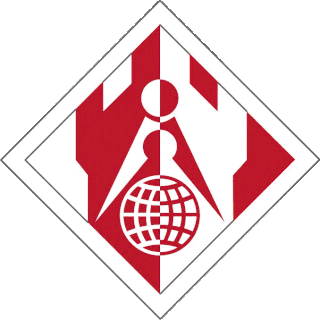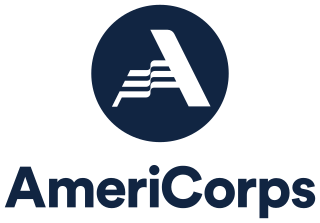
The Civilian Conservation Corps (CCC) was a voluntary government work relief program that ran from 1933 to 1942 in the United States for unemployed, unmarried men ages 18–25 and eventually expanded to ages 17–28. The CCC was a major part of President Franklin D. Roosevelt's New Deal that supplied manual labor jobs related to the conservation and development of natural resources in rural lands owned by federal, state, and local governments. The CCC was designed to supply jobs for young men and to relieve families who had difficulty finding jobs during the Great Depression in the United States. There was eventually a smaller counterpart program for unemployed women called the She-She-She Camps, which were championed by Eleanor Roosevelt.

The United States Army Corps of Engineers (USACE) is a direct reporting unit and engineer formation of the United States Army that has three primary mission areas: Engineer Regiment, military construction, and civil works. USACE has 37,000 civilian and military personnel, making it one of the world's largest public engineering, design, and construction management agencies. The USACE workforce is approximately 97% civilian, 3% active duty military. The civilian workforce is primarily located in the United States, Europe and in select Middle East office locations. Civilians do not function as active duty military and are not required to be in active war and combat zones, however volunteer opportunities do exist for civilians to do so.

The Student Conservation Association (SCA) is a non-profit group in the United States whose mission is to build the next generation of conservation leaders and inspire lifelong stewardship of the environment and communities by engaging young people in hands-on service to the land through service opportunities, outdoor skills, and leadership training.
Natural Resources Conservation Service (NRCS), formerly known as the Soil Conservation Service (SCS), is an agency of the United States Department of Agriculture (USDA) that provides technical assistance to farmers and other private landowners and managers.

The California Conservation Corps, or the CCC, is a department of the government of California, falling under the state cabinet-level California Resources Agency. The CCC is a voluntary work development program specifically for men and women between the ages of 18 and 25, offering work in environmental conservation, fire protection, land maintenance, and emergency response to natural disasters. Members of the CCC are referred to as "Corpsmembers", and are paid a monthly stipend; starting July 2022, the amount was $2,600.

Ecological restoration, or ecosystem restoration, is the process of assisting the recovery of an ecosystem that has been degraded, damaged, or destroyed. It is distinct from conservation in that it attempts to retroactively repair already damaged ecosystems rather than take preventative measures. Ecological restoration can reverse biodiversity loss, combat climate change, and support local economies. Habitat restoration involves the deliberate rehabilitation of a specific area to reestablish a functional ecosystem. To achieve successful habitat restoration, it's essential to understand the life cycles and interactions of species, as well as the essential elements such as food, water, nutrients, space, and shelter needed to support species populations. When it's not feasible to restore habitats to their original size or state, designated areas known as wildlife corridors can be established. These corridors connect different habitats and open spaces, facilitating the survival of species within human-dominated landscapes. For instance, marshes serve as critical stopover sites for migratory birds, wildlife overpasses enable animals to safely cross over highways, and protected riparian zones within urban settings provide necessary refuges for flora and fauna. The United Nations named 2021-2030 the Decade on Ecosystem Restoration.

The National Civilian Community Corps (NCCC), or AmeriCorps NCCC, is an AmeriCorps program founded in 1993 that engages 18- to 26-year-olds in team-based, residential community service projects across the United States. Each year, approximately 2,200 individuals representative of all colors, creeds, states, and economic statuses are chosen to serve in one of four regions covering all 50 states and five territories.

Northwest Service Academy (NWSA) was an AmeriCorps program in the Pacific Northwest which focused on environmental service. The program ended in 2010 when the Americorps grant was not renewed. Northwest Service Academy ran from 1994, as an Americorps program in the inaugural year, to 2010.

AmeriCorps is an independent agency of the United States government that engages more than five million Americans in service through a variety of stipended volunteer work programs in many sectors. These programs include AmeriCorps VISTA, AmeriCorps NCCC, AmeriCorps State and National, AmeriCorps Seniors, the Volunteer Generation Fund, and other national service initiatives. The agency's mission is "to improve lives, strengthen communities, and foster civic engagement through service and volunteering." It was created by the National and Community Service Trust Act of 1993. In September 2020, the agency rebranded itself as AmeriCorps, although its official name is unchanged.
American Forests is a 501(c)(3) non-profit conservation organization, established in 1875, and dedicated to protecting and restoring healthy forest ecosystems. The current headquarters are in Washington, D.C.

The Montana Conservation Corps (MCC) is a young adult voluntary development program modeled after the Civilian Conservation Corps of the 1930s, using conservation projects to foster citizenship and personal growth in its members. The MCC operates crews in four towns throughout Montana: Missoula, Kalispell, Helena, and Bozeman. In addition MCC's central office is located in Bozeman.

The Wisconsin Department of Natural Resources (WDNR) is a government agency of the U.S. state of Wisconsin charged with conserving and managing Wisconsin's natural resources. The Wisconsin Natural Resources Board has the authority to set policy for the WDNR. The WDNR is led by the Secretary, who is appointed by the Governor of Wisconsin. The WDNR develops regulations and guidance in accordance with laws passed by the Wisconsin Legislature. It administers wildlife, fish, forests, endangered resources, air, water, waste, and other issues related to natural resources. The central office of the WDNR is located in downtown Madison, near the state capitol.
Rural Action is a non-governmental organization working in Appalachian Ohio promoting economic, social and environmental justice. The organization envisions a region of clean streams, healthy forests, thriving family farms, meaningful jobs for everyone and lively towns that remember local history and celebrate their stories.
Mitigation banking is the preservation, enhancement, restoration or creation (PERC) of a wetland, stream, or habitat conservation area which offsets, or compensates for, expected adverse impacts to similar nearby ecosystems. The goal is to replace the exact function and value of specific habitats that would be adversely affected by a proposed activity or project. The public interest is served when enforcement agencies require more habitat as mitigation, often referred to as a mitigation ratio, than is adversely impacted by management or development of nearby acreage.
America's WETLAND Foundation (AWF) was a nonprofit, tax exempt 501(c)(3) organization with the stated mission to save and conserve coastal wetlands in the U.S. state of Louisiana. The organization aimed to achieve this mission through a public awareness campaign on the impact Louisiana's wetland loss has on the state, region, nation and world.

The Edward M. Kennedy Serve America Act or Serve America Act was introduced in the United States House of Representatives on March 9, 2009, by Representative Carolyn McCarthy of New York. Originally titled the Generations Invigorating Volunteerism and Education Act, the bill reauthorizes and expands the AmeriCorps program that was first established in 1993. It passed in the House of Representatives on March 18, 2009. The U.S. Senate debated and approved an amended version of the bill on March 26, 2009, renaming it the Edward M. Kennedy Serve America Act, after Senator Ted Kennedy. The House of Representatives voted on the bill a second time, approving the amended version on March 31, 2009. It was signed by President Barack Obama on April 21, 2009.
The Public Land Corps (PLC) is a work and education program for young people and veterans that is run by the United States land management agencies in association with state conservation and service corps. The objective is the rehabilitation and restoration of public land resources and infrastructure. The Public Land Corps was authorized by the National and Community Service Trust Act on May 27, 1993, H.R. 2328. The 21st Century Conservation Service Corps Act in 2019 allowed Public Land Corps to partner with more federal agencies on conservation and restoration projects and created the Indian Youth Service Corps within the Public Land Corps.
Maia D. Bellon is an American attorney and former government official from the State of Washington. She served as Director of the Washington Department of Ecology from 2013 to 2020. A member of the Mescalero Apache, Bellon was the first Native American to serve as a member of the Washington cabinet.
Darrin Brian Madison Jr. is an American justice activist and Democratic politician from Milwaukee, Wisconsin. He is a member of the Wisconsin State Assembly, representing Wisconsin's 10th Assembly district since January 2023.
The American Climate Corps is a national service of the US government focused on climate change prevention. It was launched in September 2023 by the Biden administration, and is a government interagency project between the National Oceanic and Atmospheric Administration and the Departments of Labor, Interior, Agriculture, and Energy and AmeriCorps. The service plans to recruit 20,000 young people, and train them for public service or the private sector.











